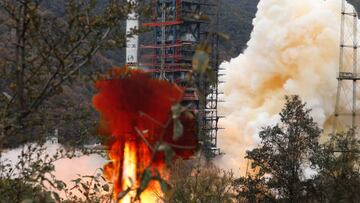SPACE
Space Race: What happens if China gets to the Moon first?
NASA’s administrator has given an interview highlighting the perceived threat from China in space.

Back in 1969 Neil Armstrong uttered his famous words and took the first human steps on the moon. Since then 11 Americans have followed in his footsteps. However no one has touched the surface in 50 years, something NASA is desperate to change. The new Artemis mission hopes to achieve the feat in the coming years.
Back in the 1960s there was no question of China reaching space, let alone the moon, anytime soon. However, leaps in Chinese aerospace technology in the past two decades as well as a bullish and relentless leader in the form of Xi Jinping have the Asian superpower on the verge of putting its own astronauts, called taikonauts, on the satellite by the end of the decade.
The US government is worried about this.
“It is a fact: we’re in a space race,” Bill Nelson, NASA administrator, told Politico. “And it is true that we better watch out that they don’t get to a place on the moon under the guise of scientific research. And it is not beyond the realm of possibility that they say, ‘Keep out, we’re here, this is our territory.’”
The last ‘space race’ was between the US and the Soviet Union. Given a bloody nose by the Soviets firing the first man-made object into space with Sputnik in 1957 quickly followed by the first man, Yuri Gagarin, in 1961.
The US declared victory in the race by landing on the moon despite finishing behind the Soviets in every other measure.
We choose to go to the Moon in this decade and do the other things, not because they are easy, but because they are hard... that challenge is one that we are willing to accept, one we are unwilling to postpone, and one we intend to win.
A new cold war between the US and China?
This should be seen in the context of the US and many western government designating China as a power to be wary of in the coming years. Back in August Secretary of Defence Lloyd Austin said China was “trying to refashion both the [east Asia] and the international system to suit its authoritarian preferences.”
With a new, more hawkish, House of Representatives expect further rhetoric against China. Polling suggests two-thirds of both Chinese and American adults view “the other side as an enemy or unfriendly.” Despite comments from governments and political figures the American-Chinese partnership remains important due to the US reliance on Chinese manufacturing; US data indicates that the country had a $355.3 billion trade deficit with China in 2021. For its part, the Chinese economy is predicted to eclipse that of the US by 2035, quite remarkable for a country which had a poverty rate of 85 percent just over 40 years ago.
“Outer space is not a wrestling ground,” Liu Pengyu, spokesperson for the Chinese embassy in Washington, said.






